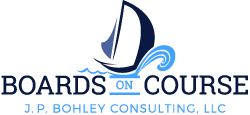Policy Governance®
Implementing Policy Governance®
Transitioning to Policy Governance® involves steps such as the following. While the following sequence is common, the sequence and timing of the implementation of model components can certainly be customized for your board.
- Your board members become knowledgeable about Policy Governance®. Consultant provides a half to full-day didactic and experiential review of the powerful principles of the Policy Governance® board operating system. This session is customized to your board and provides sufficient information for your board to decide if it wishes to proceed to implement the Policy Governance® system. A board self-assessment survey is recommended and assists with customizing the session to your individual board.
- Your board develops its policy manual. A consultant-guided session enables your board to develop a core policy manual. This session generally lasts one day and focuses on development of Executive Limitations policies, Governance Process policies, and Board-Management Delegation policies. If the session lasts more than one day, your board may begin development of its Ends policies.
- Your board approves its new policy manual and sets a date for its transition to Policy Governance®. When your board is satisfied with its core policy manual, your board sets an effective date for implementation of its policies and for its transition to Policy Governance®.
- Your board bylaws are revised to be consistent with your board’s new policy manual. Consultant assistance is available to assist your board in its review and revision of its bylaws.
- Your CEO begins development of measurable interpretations of board policies. Off-site and on-site coaching and a workshop session are available to assist your CEO and staff in developing operational definitions of your board’s policies. Operational definitions define specific measurable criteria to be used by your board in assessing compliance with its policies. While these definitions are developed by the CEO they must be accepted by your board as reasonable interpretations of board policies.
-
Your board begins monitoring of CEO and organizational performance. Your board implements an annual schedule for its monitoring of Executive Limitations policies. Once Ends policies are developed, monitoring of these is included in your board’s annual monitoring schedule. Consultation assistance is available to help your CEO and staff develop monitoring reports and to help your board in its review of these reports.
-
Your board develops and implements its board self-evaluation plan. Off site coaching is available to assist your board in the development and implementation of its self-evaluation plan. Self-evaluation includes an ongoing review of its compliance with its Governance Process and Board-Management Delegation policies. Other self-evaluation methods might include a process review at the end of each board meeting, a brief survey questionnaire completed by each board member after board meetings, assignment of specific policies to individual board members who become expert in those policies, etc.
-
Your board develops its initial Ends policies. Consultation assistance including a workshop session is available to help your board develop its Ends policies. Generally, this occurs a couple months or so after your board’s transition to Policy Governance® (unless these policies were developed in the Policy Development Session in conjunction with your board’s other policies). Ongoing development and refinement of Ends policies is a central focus of your board’s deliberation and is informed by your board’s knowledge of and interaction with its “owners” – those people on whose behalf your board governs and to whom it is accountable.
-
Your board develops and implements its initial Ownership Linkage plan. Consultation assistance including a workshop session is available to help your board develop its plan for ongoing conversation with its "owners." Your plan may be a multi-year plan that identifies various segments of your "ownership" and methods to be used to communicate with them.
- Your board continues to fine-tune its practice of the Policy Governance® model and its engagement in creative future-focused boardroom dialogue. Consultation assistance is available to help your board in its ongoing assessment of its fidelity to the Policy Governance® model and in its continuous improvement of its performance as an “on course” board committed to future-focused boardroom dialogue.
